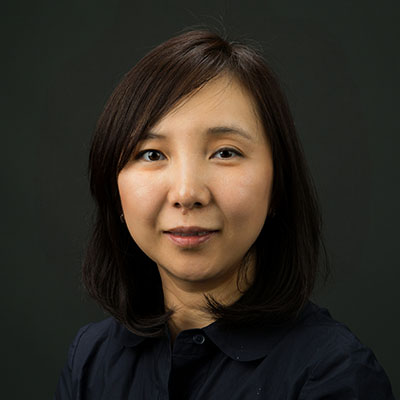First two Dr. Satish C. Saxena professorship in chemical engineering appointments announced
Text block one
Dean Peter Nelson announced two new appointments in the department of chemical engineering.
“It gives me great pleasure to announce that Professors Vikas Berry and Ying Liu will be the recipients of the Dr. Satish C. Saxena professorship in chemical engineering,” Nelson said. “These are the first two endowed professorships in the department of chemical engineering and are named after our dear friend and colleague, the late Professor Satish C. Saxena.”
Dr. Satish Saxena’s immense contributions to the field of chemical engineering, to the college of engineering, and to the scientific community are what this professorship is dedicated to. Professor Saxena started his position at the University of Illinois Chicago in 1968 as a professor and director of his Multiphase Reactor Research Laboratory and then served as the department head for the forerunner of the chemical engineering department for several years. During his lifetime, he published five books, 25 book chapters, and more than 532 papers. He mentored and supervised more than 20 postdocs, 22 PhDs, and 57 MS students, and taught thousands of other students. His groundbreaking work led to the revolutionizing of several multiphase catalytic reactors that are still operational in the chemical industry. The Mason-Saxena equation is used across the world to determine the thermal conductivity of gas mixtures. The academic community will continue to honor Dr. Saxena’s spirit of scientific inquiry and academic excellence that has transformed engineering and impacted so many lives.
Below are brief biographies of Vikas Berry and Ying Liu.
Text block two

Dr. Satish C. Saxena Professor of Chemical Engineering Vikas Berry
Vikas Berry has made pioneering contributions in the fields of 2D nanomaterials, bio/nanotechnologies, and diagnostic devices. His group studies ultrasensitive materials that are only 1 to 10 atoms thick and develops applications in diagnostics, sensors, photovoltaics, electronics, and fuel cells.
Dr. Berry’s research breaks down into two broad areas: biomedical sensors and renewable energy. We all know people who have been affected by either cancer or COVID or both. Early detection of both illnesses can save and improve lives. This has been the mission of Dr. Berry’s research group over the last several years. His group combines nanotechnology, biomolecular interactions, and phononic science to build highly sensitive and highly selective detection devices for cancer (glioblastoma and skin), COVID, and ALS.
Another area of research pursued by Dr. Berry’s lab is renewable energy. Since the industrial age, the amount of carbon dioxide in the atmosphere has increased by 47% with the year 2020 recorded as the 2nd hottest year on earth. To address global warming and provide a sustainable environment for the next generation, there is a need to produce energy efficiently from renewable sources. Dr. Berry’s research group has employed nanoscale and molecular engineering to build next-generation ultrathin solar cells. Further, his group engineered conductive nanoparticles on the microscale surface of electrogenic bacteria to produce efficient microbial fuel cells, where bacteria produce electrical power.
Dr. Berry received his bachelor’s degree from the Indian Institute of Technology-Delhi, India, in 1999, followed by a master’s degree from the University of Kansas in 2003, and a doctorate degree from Virginia Polytechnic Institute and State University in 2006. He has earned many honors, including the NSF-CAREER Award, Sigma Xi Outstanding Junior Scientist Award, Rudolph A Marcus Award, and Big 12 Fellowship in 2009. Previously, Dr. Berry received the William H. Honstead Professorship at K-State, which lasted till his move to UIC in 2014.
Text block three

Dr. Satish C. Saxena Professor of Chemical Engineering Ying Liu
Ying Liu’s research focuses on developing nanoengineered drug delivery systems to address current biomedical challenges. A relevant recent example illustrating the power of nanomedicine is using specific lipid nanoparticles for the delivery of mRNA to generate COVID-19 vaccines effectively and rapidly.
The Liu research group has established several novel self-assembly processes to generate nano- and microparticles with well-controlled features for targeted delivery and sustained release of small-molecular drug compounds, oligonucleotides, nucleic acids, peptides, proteins, and therapeutic cells to disease sites. These self-assembly processes are scalable and highly reproducible, which are essential for clinical translation and commercialization. Dr. Liu’s earlier research on the design and characterization of the confined-impinging mixing for nanoprecipitation has been adopted by Pfizer for massive production of the mRNA vaccine for COVID-19.
Through collaborating with UIC internal and external medical experts, Dr. Liu’s innovative research has led to the discovery of several therapies and the development of potential treatments for complex diseases, including pain and addiction, depression, heart disease, internal bleeding, lung infection, and various cancers.
Ying Liu received her B.S. in Engineering Mechanics from Tsinghua University in Beijing, China in 2001, and her Ph.D. in Mechanical and Aerospace Engineering from Princeton University in 2007. She was a postdoctoral researcher at the University of Chicago in the Department of Chemistry and James Frank Institute for one year before joining UIC in 2008. Ying Liu has been the recipient of several awards, including NSF CAREER Award, UIC Researcher and Scholar of the Year Rising Star Award, and College of Engineering Research Award.